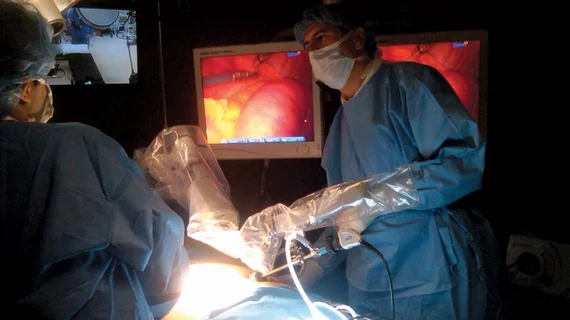Bariatric surgery linked to 40% reduction in CV events for type 2 diabetics
Bariatric surgery may help reduce cardiovascular events beyond normal treatment with medication and lifestyle modifications for patients with severe obesity and type 2 diabetes, suggests an observational study published in JAMA.
Patients who went under the knife had a lower incidence of macrovascular disease events (2.1 percent) at five years than nonsurgical patients (4.3 percent) with similar baseline characteristics. After further adjustment, weight-loss surgery was associated with a relative risk reduction of 40 percent for those events, which encompassed coronary artery disease (acute MI, unstable angina, percutaneous coronary intervention, coronary artery bypass grafting) and cerebrovascular disease (ischemic or hemorrhagic stroke, carotid stenting, carotid endarterectomy).
“These findings have strong biological plausibility and are consistent with other research,” wrote lead author David P. Fisher, MD, with Kaiser Permanente Northern California, and colleagues.
“Randomized trials have demonstrated that bariatric procedures are more effective than the best-available intensive medical and lifestyle interventions in promoting weight loss, improving glycemic control and serum lipid levels, and reducing the need for medications used to control diabetes, hypertension, and dyslipidemia. Improvements in these parameters after bariatric surgery result in lower cardiovascular risk scores, as measured through validated tools such as the Framingham risk equation.”
The researchers took 5,301 patients who underwent bariatric surgery and matched them to 14,934 non-surgery controls based on treatment site, age, sex, body mass index (BMI), hemoglobin A1c, insulin use and observed diabetes duration. All participants had type 2 diabetes and severe obesity, defined as BMI of 35 or higher.
Surgery appeared to be slightly more protective against coronary artery disease (CAD) events compared to cerebrovascular ones, with relative risk differences of 36 and 31 percent, respectively, versus nonsurgery. Only the reduction in CAD events was determined to be statistically significant.
“Health care professionals should engage patients with severe obesity and type 2 diabetes in a shared decision-making conversation about the potential role of bariatric surgery in the prevention of macrovascular events,” Fisher et al. wrote.
The authors said their study wasn’t powered to compare the effectiveness of different bariatric procedures. Seventy-six percent of the surgical patients had Roux-en-Y gastric bypass (RYGB), while 17 percent had sleeve gastrectomy (SG) and 7 percent had adjustable gastric banding.
“There has been a shift toward increased use of the SG procedure in recent years in the United States, and although this study included 17% SG, it is unclear whether the benefits observed in a primarily RYGB population will be seen with SG,” the researchers noted.
Given the accumulating evidence about bariatric surgery’s ability to improve microvascular and macrovascular disease outcomes, the authors of an accompanying editorial said it’s time to ask why weight-loss operations aren’t as well-accepted as drug therapy for type 2 diabetes.
“Even though there appears to be relatively weak evidence supporting aggressive medical management of type 2 diabetes for reducing CV events and mortality, evidence for the benefits of bariatric surgery for improving these outcomes is increasing,” wrote Adam C. Sheka, MD; Keith M. Wirth, MD; and Sayeed Ikramuddin, MD, MHA—all with the department of surgery at the University of Minnesota. “Yet, access to bariatric surgery is limited by stringent private insurance requirements, lack of Medicaid coverage in some states, and high out-of-pocket costs.”
The editorialists suggested insurance coverage for these operations be expanded, given their “potentially greater long-term benefits than most pharmaceuticals.”

